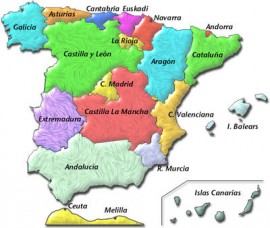- Fecha(s): 13/02/2015
- Lugar: Seminario Martínez Gallur, Facultad de Economía y Empresa. Se retransmitirá en directo.
- Ponente: Roberto Ramos, Banco de España

Abstract En este trabajo documentamos la existencia de aglomeración geográfica de empresas exportadoras según el país de destino de las exportaciones utilizando microdatos de la Balanza de Pagos. En este sentido, encontramos que las empresas que venden a países con peores instituciones, donde no se habla español y que tienen una moneda diferente tienden a…
- Fecha(s): 05/02/2015
- Lugar: Seminario del Departamento de Métodos Cuantitativos para la Economía y Empresa, UMU. Se retransmitirá en directo.
- Ponente: Yolanda Blasco Martel, Universidad de Barcelona

Abstract El Banco de Barcelona se creó en 1844 alrededor de un grupo de individuos que, hacia mediados de la década de 1850, tenían establecida una amplia red social conformada a través de las inversiones del grupo en las principales sociedades anónimas de la época ((Badia-Miró, Blasco-Martel, Lozano, & Soler, 2013) y (Badia-Miro, Blasco-Martel, Lozano,…
- Fecha(s): 29/01/2015
- Lugar: Seminario del Departamento de Métodos Cuantitativos para la Economía y Empresa, UMU. Se retransmitirá en directo.
- Ponente: Angel de la Fuente, Fedea

Abstract En este trabajo se presenta una metodología para la construcción de un Sistema de Cuentas Públicas Territorializadas (SCPT) elaborado desde la óptica carga-beneficio, así como una aplicación de esta metodología al caso del año 2011. El SCPT ofrece una radiografía detallada de la distribución regional de los flujos de gastos e ingresos públicos y…
- Fecha(s): 16/01/2015
- Lugar: Seminario del Departamento de Métodos Cuantitativos para la Economía y Empresa, UMU. Se retransmitirá en directo.
- Ponente: Francisco Alcalá, Universidad de Murcia

Abstract There appears to be notable differences in average effort at work (pace and attentiveness) across countries, which affect relative TFP and comparative advantage. These differences are typically assumed to be the consequence of an exogenous cultural trait: industriousness; more industrious countries would thrive relative to more indolent ones. However, it is hard to accept…
- Fecha(s): 15/01/2015
- Lugar: Seminario del Departamento de Métodos Cuantitativos para la Economía y Empresa, UMU. Se retransmitirá en directo.
- Ponente: Oscar Arce, Banco de España

Abstract We assess the effects of reforms in product and labor markets in a model economy featuring credit restrictions and pre-existing long-term debt. Both elements, which are core features of the current scenario faced by some Euro area countries, combine to produce a slow deleveraging of the private sector and a persistent recession following a…
- Fecha(s): 17/12/2014
- Lugar: Seminario del Departamento de Métodos Cuantitativos para la Economía y Empresa, UMU. Se retransmitirá en directo.
- Ponente: María Victoria Caballero, UMU

Abstract In this paper we introduce the symbolic correlation integral SC(m), which avoids the noisy parameter » of the classical correlation integral defined by Grassberger-Procaccia. Moreover we provide the asymptotic distribution of SC(m) under the null of i.i.d. With a MonteCarlo simulation we show the size and the power performance of the new test under…
- Fecha(s): 11/12/2014
- Lugar: Seminario del Dpto de Métodos Cuantitativos para la Economía y la Empresa, Facultad de Economía y Empresa, Murcia. Se procurará retransmitirlo en directo para doctorandos/as e investigadores/as remotos/as del Programa.
- Ponente: José Antonio Espín Sánchez, Yale University

ABSTRACT: In 1966, the irrigation community in Mula (Murcia, Spain) switched from a market (auction), which had been in place in the town for over 700 years, to a system of fixed quotas with a ban on trading, to allocate water from the town’s river. We present a model, in which farmers face liquidity constraints…
- Fecha(s): 05/12/2014
- Lugar: Seminario Mtnez Gallur, Facultad de Economía y Empresa Campus de Espinardo, Murcia. Se procurará la retransmisión en directo para doctorandos/as e investigadores/as remotos/as del Programa.
- Ponente: Juan Carlos Negrete, UMU

ABSTRACT: We consider a monetary union where discretionary monetary policy creates the classical inflation bias. We analyze how the design of the central bank interacts with fiscal policy under distortionary taxation. We show that when countries share a single currency the perils of not having a conservative enough central bank are more severe. This result…
- Fecha(s): 27/11/2014
- Lugar: Seminario del Dpto de Métodos Cuantitativos para la Economía y la Empresa, UMU. Retransmisión en directo vía el AV.
- Ponente: Daniel Tirado Fábregat, Universidad de Barcelona

ABSTRACT: Según los datos ofrecidos por el Eurostat Regional Yearbook de 2012, la persistencia de una elevada desigualdad territorial sigue siendo uno de los grandes problemas que enfrenta la Unión Europea. Si tomamos las NUTS2 como unidad territorial básica, el PIB per cápita de la región más rica de EU27 (Inner London) alcanza un valor…
- Fecha(s): 20/11/2014
- Lugar: Seminario del Dpto de Métodos Cuantitativos para la Economía y la Empresa, Facultad de Economía y Empresa, Murcia. Se procurará retransmitirlo en directo para doctorandos/as e investigadores/as remotos/as del Programa.
- Ponente: María Angeles Carnero, Universidad de Alicante

ABSTRACT: The identification of asymmetric conditional heteroscedasticity is often based on sample cross-correlations between past and squared observations. In this paper we analyse the effects of outliers on these cross-correlations and, consequently, on the identification of asymmetric volatilities. We show that, as expected, one isolated big outlier biases the sample cross-correlations towards zero and hence could hide true leverage…











